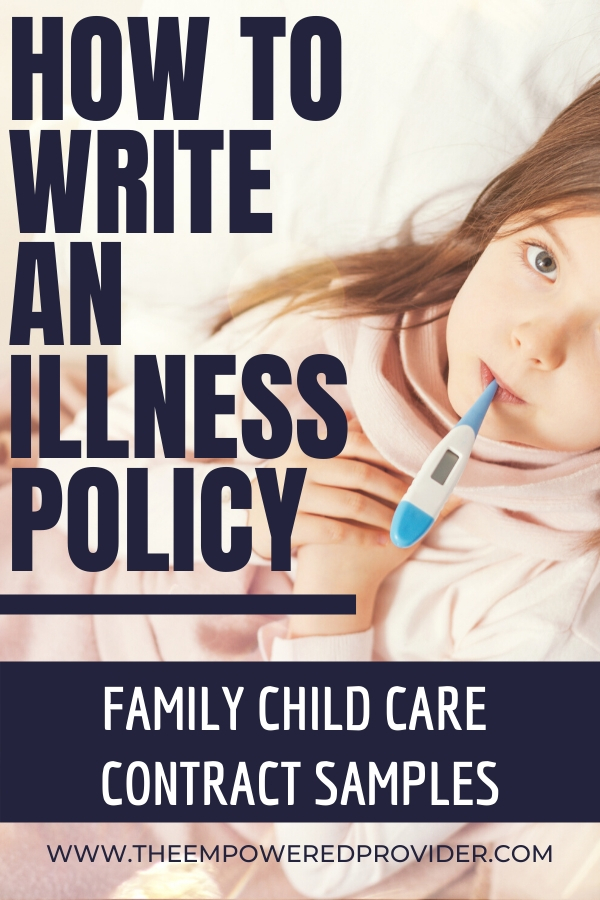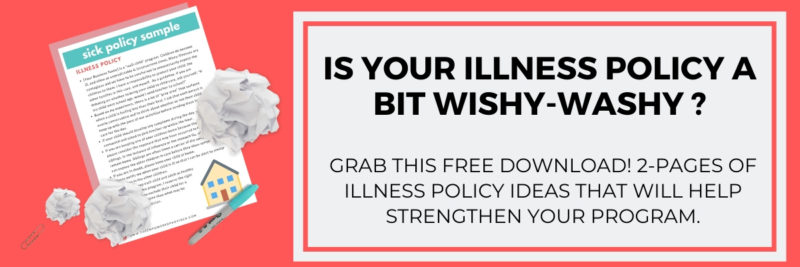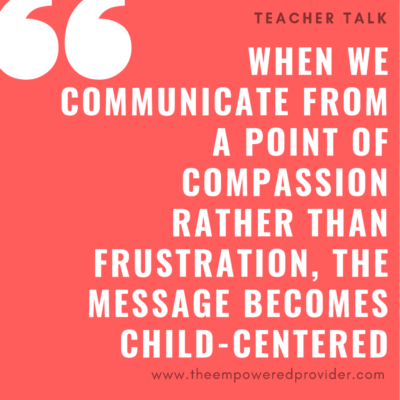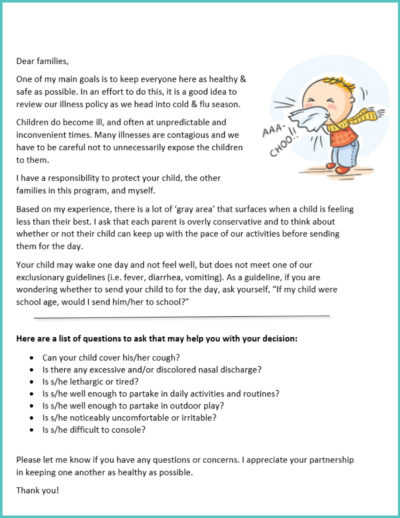Most family child care programs have a daycare sick policy. This is a formal set of documentation between a provider and their client that is put into place to inform the client of when they should keep their child home in the case of illness.
A common frustration I hear from family child care providers is that their clients don’t adhere to the policies that have been agreed upon in an effort to minimize the spread of illness.
In this article, my goal is to do two things:
- Inform parents of when and why they should keep their sick child home. Help parents gain a better understanding of these policies from a provider’s perspective.
- Support child care providers by helping them write an effective illness policy and how to address the dreaded gray area that accompanies things like runny nose and a persistent cough.
Be sure to save this article to your Child Care Business board in Pinterest to refer back to later!

When to Keep Your Child Home from Daycare: Tips for Parents & Providers
Knowing when to keep your child home can be difficult at times. Giving an explanation for various illness and offering experience-based suggestions can help your client uphold the ins and outs of your illness policy.
Let’s start with the more obvious symptoms & conditions:
Disclaimer: The following tips on exclusion are only suggestions. Rules may vary from state to state. Check with your licensor when creating guidelines for exclusions.
Daycare Fever Policy:
A common guideline: A fever can be a sign that the body is fighting off an infection. In most states, if a child has a fever over a certain temperature (typically 101° F), they will need to be excluded.
Personal Experience: My policy was a bit firmer. Anything over 100 °F was grounds for exclusion in my program. This is about the level by which I would notice the fevering child to have rosy cheeks and watery eyes along with an onset of lethargy.
When can they return? The child should stay home until they are fever-free for 24 hours without the help of fever-reducing medication.
Daycare Vomiting Policy:
A common guideline: If a child vomits 2 or more times in a 24 hour period they should stay home.
Personal Experience: In my program, I held firm on one episode of vomiting in a 24 hour period. One episode was almost always followed up by another one…and another.
When can they return? The child should stay home until they are symptom-free for 24 hours. Keep in mind, when a child has been vomiting, they may be exhausted for at least a day with little energy.
Daycare Diarrhea Policy:
A common guideline: If a child has 2 or more episodes of diarrhea in a 24 hour period they should stay home.
Personal Experience: Guess what childhood developmental milestone lends itself to diarrhea? Teething! However, if the child had loose stools I would send them home. 9 times out of 10, the child was indeed ill and was putting the other children at risk by staying for the day.
When can they return? The child should stay home until they are symptom-free for 24 hours.
Strep Throat:
A common guideline: If a child has been diagnosed with strep throat, most physicians will tell you the child needs to stay home until they have been on the medication for 24 hours to reduce the spread of the virus.
Personal Experience: Once the child has been on the medication for 24 hours it is good to assess how the child is feeling. While they may not be contagious after 24 hours on medication, they may still be feeling miserable and need to stay home and rest.
When can they return? The child should stay home until they are on the medication for at least 24 hours; only returning when they feel better.
Major Injury:
A common guideline: Exclusionary guidelines will be dependent on the type of injury and what is agreed upon between the provider and her client.
Personal Experience: Often times when a child gets hurt or injured, they may just want to be home in their own bed or in the arms of mom or dad. A child care program isn’t as quiet as home and when a child is suffering from an injury, being surrounded by kids who are running, jumping, cheering, crying or screaming might not be the best plan.
When can they return? This answer will be totally dependent on the child and the type of injury.
Illnesses that create gray area around a provider’s policies
Kids experience a lot of illnesses that leave them feeling less than their best but are they well enough to attend their child care program?
Let’s take a look at few common childhood illnesses that are the mild side and what to do when making the decision to exclude a child or not.

Runny Nose
What’s Up? A runny nose can be a sign of something contagious or simply a symptom of a seasonal allergy. It can be very difficult to distinguish between the two. Here is some helpful information to note about runny noses from healthychildren.org.
The Issue: Kids can have runny noses that lasts for weeks…WEEKS! If a provider requires a family to keep their child home for every cough and sniffle, the child would be stuck at home quite often.
Client Frustration: Clients grow frustrated because they fear they are running out of vacation days and other options for alternate child care if their provider insists that the child stay home when the only symptom is a runny nose.
Daycare Sick Policy for a Runny Nose: Should the child attend?
Ask yourself the following questions:
- Is there anything unusual about the runny nose? Color? Intensity?
- Is the child lethargic or irritable?
- Can the child keep up with the daily activities of the program?
- Does the child’s symptoms pose a risk to the other kids in the program?
Cough
What’s Up? There are several different types of coughs. Some signal there is something more severe going on while others are a simple symptom of the common cold or allergies.
The Issue: It’s terribly difficult to know the difference. Providers fear that an intense cough from a child who does not know how to cover their cough sufficiently will lead to a spread of the illness.
Client Frustration: Clients grow frustrated because they fear they are running out of vacation days and other options for alternate child care if their provider insists that the child stay home when the only symptom is a cough.
Should the child attend if they have a cough?
Ask yourself the following questions:
- Have the child seen by the doctor to rule out anything serious.
- Is the child miserable, irritable or lethargic?
- Is he/she able to participate in the program’s daily activities?
- Can the child cover his/her cough consistently?
- Consider the well-being of the other kids in the program. Is this cough putting other kids at risk?
Daycare Sick Policy Payment
It is a completely acceptable question for parents to ask whether or not they need to pay for services on a day their child is kept home due to illness.
A provider who has written a thorough child care contract will have addressed this question in her/his initial contract.
In most cases, a family will still need to pay for a day their child is absent due to illness.
PREVENTING ILLNESS IN A CHILD CARE SETTING
Avoiding illness in early childhood is impossible but there are ways to minimize how often kids get sick in family child care:
- Keeping a sick child home and allowing enough time for full recovery.
- Establish good hand-washing skills.
- Teach the child to cough into their elbow.
- Encourage young kids to keep things out of their mouth (I know..impossible!).
- Put mouthed toys in a bucket to be sanitized before returning to the play space.
- See your physician when you are unsure about a heavy cough, runny nose or rash. Assuming a child isn’t contagious is risky business.
Why Does My Child Keep Getting Sick at Daycare?

Children often get sick and as Murphy’s Law would have it…usually at inopportune times for the adult. Whether there’s a big family vacation planned or mom has an important meeting at work that she simply cannot miss…this is when kids get sick.
Parent Magazine agrees that illness in early childhood is unavoidable; mainly due to the fact that a child’s immune system is still developing:
“…kids are born with some immunity from their mom, which fades as the months go by. At the same time, their own immunity is building. In between — when babies are 6 to 12 months old — they get more infections, on average, than at any other time. They also get more October through March. And on average, all kids in day care get more than their peers. So you’ve just finished the most vulnerable time of the year at the most vulnerable age in day care. Infections would be expected, regardless of their policies.”
-Alan Greene, MD, FAAP
HOW TO WRITE AN EFFECTIVE ILLNESS POLICY IN FAMILY CHILD CARE

Writing an illness policy that covers every single situation that will come your way is nearly impossible. Place a heavy focus on the big contenders that cause the most problems in a program filled with young kids: Vomiting, Diarrhea and a Fever.
Draw a firm line in the sand as these symptoms are typically backed by your county’s licensing rules and your local public health nurse.
Ask other providers in your area if you can take a peek at their policy. Ask them what is working for them and if there is anything they plan to add. Combining their experiences with yours lends itself to a more thorough policy.
Daycare Sick Policy PDF

Remind Your Clients About Your Policy at the Start of Cold and Flu Season
Some of your clients may have received paperwork regarding your illness policy in the middle of summer when things like the flu, colds and stomach bugs were not on their radar.
What better time than good old ‘Cold and Flu Season’ to send out a friendly letter as a way of reminding parents to err on the side of caution when deciding whether or not to send their child when they are ill.
If you are having trouble with clients bringing their sick child to your program, try sending out a letter like this one at the start of cold and flu season. Click the letter to download your FREE copy to print, sign and distribute.
Daycare Sick Policy Reminder Letter PDF
5 MORE TIPS FOR ESTABLISHING AN EFFECTIVE ILLNESS POLICY:
- Write a clear and concise policy. Check out the sample policy for child care below.
- Address this topic thoroughly during the interview process with potential clients. Your family child care illness policy is not the section to skim over and hope your client will read it. Talk about your illness policy and share various scenarios with them. Remind them that by having a conservative illness policy means that you are working hard to protect their child. Answer any questions they may have.
- Help families create an alternate care plan for when their child is not feeling well. Scrambling at 6:00am to find someone to take your child for the day isn’t easy. Having a plan in place will help clients not feel ‘forced’ to bring their child to you when they are under the weather.
- Post reminders regarding your illness policy in your newsletter, in an email or in a simple note home. Put the child’s well being at the forefront of the discussion.
- Add a section about ‘Gray Area’ within your illness policy.
- Have a private conversation with your client if you have concerns about them sending their child when they are ill.
Communication and clarity will bring you the most success when managing your family child care illness policy. Say what you mean and mean what you say.
Remember! It is most important to lace each announcement or decision you make with empathy, patience and understanding when it comes to your tolerance level with colds in early childhood.

Unfortunately, caring for kids with a runny nose and/or a cough is a part of the family child care provider gig. Determining guidelines and procedures before a cold strikes is your best effort to maintaining a frustration free program when it comes to illness.
While we’re on the topic of contracts and policies…how’s your vacation policy lookin’ these days? Click HERE for some helpful tips.
Disclaimer: The information in this article is designed for educational purposes only. It is not intended to be a substitute for licensing regulations or medical advice.


 Hey there! I hold the work of early childhood educators (my title for family child care providers) in the highest regard! If you are looking for ways to better your business or to find inspiration to bring joy and meaning to your classroom, then you've come to the right place! Click here to read more!
Hey there! I hold the work of early childhood educators (my title for family child care providers) in the highest regard! If you are looking for ways to better your business or to find inspiration to bring joy and meaning to your classroom, then you've come to the right place! Click here to read more!
My family is moving this year and we are trying to find a new daycare for our youngest son. We want to find a place that is really trustworthy and has high standards. I think it’s a great idea to look for a place that will tell us when we need to keep our kids at home because people are sick.
Hi Bryson! Thank you for stopping by! I whole heartedly agree! A conservative illness policy may lend itself to some inconveniences to our work schedules, but in the end create a much healthier environment for the children, their families and the caregiver. Best wishes on your search for the perfect child care! Please let me know if I can be of further assistance in anyway!
Really thanks for sharing this useful post !! This post is very informative and i have got very good information about daycare sick child policy .
You are so welcome! Thanks for stopping by! Let me know what kind of other resources you are looking for!
These are quite notable content about childcare thank you for the sound advice. I have to highly agree that runny noses for kids would is a sign for something contagious and daycares should alert the family as quick as they can. This is quite informative, if I was to run a day care programs, I will consider these points you noted.